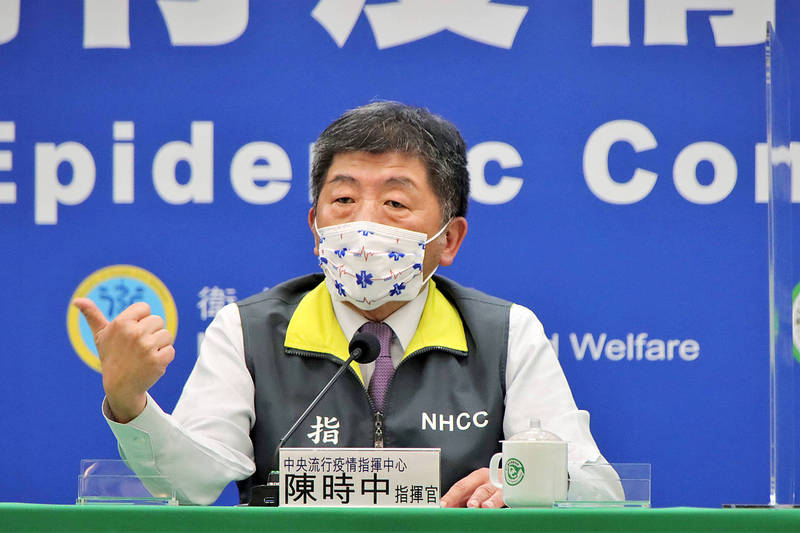《TAIPEI TIMES》 CECC eases travel limits on foreigners

Minister of Health and Welfare Chen Shih-chung speaks at the news conference in an undated photo. Photo: CNA
MAKING A MOVE: Starting on Monday, short-term business travelers can apply for shorter quarantine periods, while transits of up to eight hours would be allowed
By Lee I-chia / Staff reporter
The Central Epidemic Command Center (CECC) yesterday announced an easing of restrictions that would from Monday next week allow foreigners to visit or make a transit flight in Taiwan.
A policy allowing short-term business travelers from countries with low or medium risks of COVID-19 infections to apply for shorter quarantine periods is also to resume that day.
Minister of Health and Welfare Chen Shih-chung (陳時中), who heads the center, said that while the autumn-winter COVID-19 prevention program is to be extended after the end of this month, special conditions for foreign nationals to enter Taiwan would be restored from Monday.
Foreign nationals who hold a valid resident certificate would be allowed to enter Taiwan, while those who do not have such a certificate, but are not visiting for tourism or a social visit, can apply for a special entry permit at Taiwan’s representative office in their countries, the CECC said.
The conditions for Chinese nationals to enter Taiwan include holding a valid resident certificate, humanitarian reasons or emergency situations (such as attending a funeral or visiting a critically ill relative), or being the spouse or underaged children of a Taiwanese or a foreign national who holds a valid resident certificate.
Chinese students who have received approval from the Ministry of Education, and healthcare professionals approved by the Ministry of Health and Welfare would also be allowed entry.
The conditions for Hong Kong and Macau residents to enter Taiwan are the same, but also include those who are fulfilling commercial and contractual obligations.
Foreign travelers can stop over for up to eight hours in Taiwan if they are arriving and leaving with the same airline group, while special passenger flow routes in the airport would be assigned and monitored by airline staff members.
Foreigners who wish to enter or transit in Taiwan are required to present a negative polymerase chain reaction (PCR) test result obtained within three days before their flight, Chen said.
“They are also required to be quarantined in hotels and centralized facilities, or ‘one person per housing unit’ if in private housing,” he said.
Short-term business travelers are also required to present a negative PCR test taken three days before their flight, and to apply for a self-paid PCR test after five or seven days of quarantine.
If the test result comes back negative, they can apply to local health departments to be released from quarantine, but they are required to continue practicing enhanced self-health management until 14 days after entry, followed by self-health management from the 15th to 21st day after entry.
Foreign nationals who need medical treatment in Taiwan — not including health examinations, cosmetic or non-urgent treatment — can apply to the health ministry for special entry approval through healthcare facilities in Taiwan, Chen said.
The CECC also reported four imported cases of COVID-19 yesterday — two travelers from the US and another two from Malaysia.
The four cases had tested positive for COVID-19 between October last year and last month in the US or Malaysia, but later tested negative at least twice before coming to Taiwan, Chen said.
They completed quarantine and did not report any symptoms in Taiwan, but tested positive in self-paid tests between Sunday and Monday, he said.
Chen said that Cambodia has been moved from a list of low-risk to medium-risk countries after reporting a cluster of local COVID-19 infections on Saturday, which rose to 137 cases as of Tuesday.
The CECC’s latest list of low-risk infection countries are New Zealand, Macau, Palau, Fiji, Brunei, Laos, Nauru, East Timor, Mauritius, the Marshall Islands and Bhutan.
The medium-risk countries are Australia, Singapore, Vietnam and Cambodia.
新聞來源:TAIPEI TIMES


















